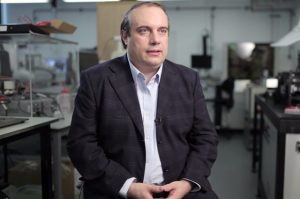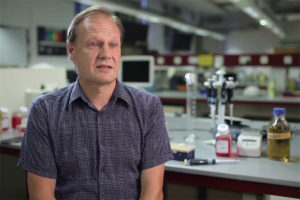Graphene
Nanotechnologist Andrea Ferrari on the properties of Graphene, its significant history, and how to send it fro...
Genome medicine, the use of the whole genome of an individual in medical care, was kind of a dream for many years. When we sequenced the human genome, it cost maybe three billion dollars: a very large amount of money, and it was actually impractical to sequence more than a few individuals. For many years, we only sequenced other species like mice or zebrafish, which were important for doing an investigation of models of humans. But around 2006, a new sequencing technology came along, and it became clear that the price could drop dramatically and the time for sequencing a genome could drop as well. So now we’re at the point where a whole genome costs less than a thousand dollars and can take only around one day on one machine. So suddenly, you go from a single genome to the ability to collect genomes around individuals at a price that fits with the kind of tests that you do in a healthcare system.
In the UK, around 2009, the government, the House of Lords, published a report on genomics in the Health Service and advised the government to start exploring whether this technology could be used to improve healthcare. In a couple of years, there was a report from inside the government, and this led to the ‘100,000 Genomes Project’, which was launched in 2012. An organization called Genomics England was created in 2013 to deliver that.
From those individual analyses, you can generate a report which can go back into the clinical system and guide doctors in terms of what drugs might be most appropriate. Or, in the case of a rare disease, really, in many cases, those patients have been investigated in the health system for many, many years without a clear idea of exactly what’s wrong with them.
If you do sequence a whole genome you may get a very precise diagnostic of exactly what’s wrong, exactly which gene has been affected, and in some cases that may suggest a treatment which you as a doctor hadn’t considered at all.
For example, there is a girl who had seizures at age four, and it wasn’t understood what was wrong. Then it turned out to be a gene that’s involved in glucose being transported into the brain: that means it’s not a brain defect, it’s an energy problem, and she could be switched to a different diet where glucose is not what’s being transported. She hasn’t been cured, but her condition has improved as a result of having better energy in the brain. So those are kind of unexpected results you get from when you didn’t have a diagnostics as a doctor, and you end up with a precise molecular diagnosis about what’s wrong.
This project is now five years old, and it’s met its target of sequencing a hundred thousand genomes. Because of the statistics we’ve gathered around how this has helped in general, it’s been decided that the health service will start sequencing genomes forever in the health system as part of normal care because before, it was a special project to just essentially test if this will be a useful way of proceeding. So now we’re going to have what’s called the ‘genome medicine service’ across the UK. Here it goes in Hospital in Kings; they’re actually the leading laboratory, one of the seven genome laboratory hubs, and this means in the future, people with rare diseases and cancer will have the option of a whole genome deciphered clinically if that’s the most appropriate way of looking at to treat them.
Of course, the big advantage of a human genome is that the genome doesn’t change during your lifetime, so you only have to sequence it once, and then you can go back and look at it for different conditions. So, at the moment, we’re only sequencing people who are ill, but if you’ve got that genome because you were ill once if you come back with a different condition, we might look at that genome again for the other condition, we don’t have to sequence it again. That will probably become the general approach for using genome data.
There are other things we can do as well: for example, pharmacogenomics, about which is the best drug for you if you have a particular illness. At the moment there’s not much testing done: normally the doctor will give you the first drug and if it doesn’t work, they’ll give you another drug, and they’ll keep trying. But by looking at your genome you may be able to work out which is the best drug and which is the right dose for you immediately.
So, we can probably improve healthcare by using genomics in a more systematic way. The next phase of this project in the genome medicine service is to sequence 500,000 human patients in the NHS over the next five years, with a possibility of sequencing 5 million over the next five years.
I’m part of Genomics England part-time from Kings, and I’ve been involved in setting up the project throughout the whole five years. There’s a side where the genomes are used directly to give feedback to a patient, but one of the particular points about this is to try to hold that data for research purposes. We’re not distributing the data because of the privacy of the individual: we must keep patients confident that their data is being protected. But we can set things up so that researchers can come and work inside a secure computer environment, do analysis, and help improve the treatments of the individuals as well because we don’t understand every individual. For some of those individuals, researchers looking at their genome will help interpret and find a better explanation of what’s wrong with them. This research side is part of the activity.

Nanotechnologist Andrea Ferrari on the properties of Graphene, its significant history, and how to send it fro...

Professor Emery Brown of MIT on what has to be monitored during anesthesia, side effects of inhalational anest...

Molecular biologist Greg Towers on the great scientific challenges, the dangers of gene therapy, and the way i...